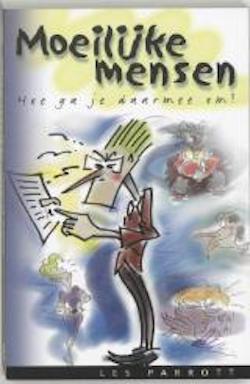
Avoiding confrontation?
My client finds himself avoiding confrontation for the following reasons:
- Fear of rejection when standing up for himself.

Conflicts and irritations at work
Jumping to conclusions is a common reason for conflicts and irritation. And a very common issue to be discussed during the coaching. When we jump to conclusions, we make unwarranted assumptions based on limited information. This type of thinking allows us to make decisions quickly, but it also means that these decisions are quite often wrong. We think we can tell what others are thinking without having any evidence to back up those often-negative assumptions. Or we are so convinced of our right and beliefs that we project our beliefs onto others. How to Reframe Your Conclusions?

Samenwerken met “moeilijke” types; klagers, treuzelaars, uitstellers
"Mijn collega zit totaal in mijn allergie ", wordt vaak genoemd als ik cliënten vraag om een lijstje te maken van wie/wat geeft je energie en wie/wat kost je energie.
Monday 04 April 2022 hits: 21394
Controlfreak omdat ik een perfectionist ben.
Het hebben van controle, vnl. op processen, zit veel van mijn cliënten in de weg. "Ik wil geen micromanager zijn ik ben notabene zelf allergisch voor een micromanager. Maar ik wil wel controleren of alles goed gaat, ik ben een perfectionist." En met deze bevestiging dat het zijn van een perfectionist een goeie eigenschap is, houden we het controle systeem in stand.
Monday 21 February 2022 hits: 18390
Conflicthantering is voor 43% van de CEO’s het belangrijkste gebied voor ontwikkeling.
Maar liefst twee derde van de CEO’s ontvangt geen coaching of extern advies ten aanzien van hun leiderschapskwaliteiten, terwijl 100% aangeeft hier wel voor open te staan. Uit een enquete waarin 200 CEO’s en andere topfunctionarissen ondervraagd zijn over hun ervaring met en mening over leiderschapsadvies. Hieronder een korte samenvatting van het onderzoek op basis van een interview van Gretchen Gavett met de twee auteurs van het onderzoek David Larcker (Stanford University) en Stephen Miles (The Miles Group).
Juist bij succes is coaching van belang. Ondanks het lage aantal CEO's dat een coach blijkt te hebben, geven vrijwel alle CEO's aan open staan voor dit type begeleiding. Raden van bestuur en andere stakeholders zouden daarbij moeten begrijpen dat het inschakelen van coaches het verschil kan maken tussen een goede organisatie en een visionaire organisatie.
Pagina 5 van 18








